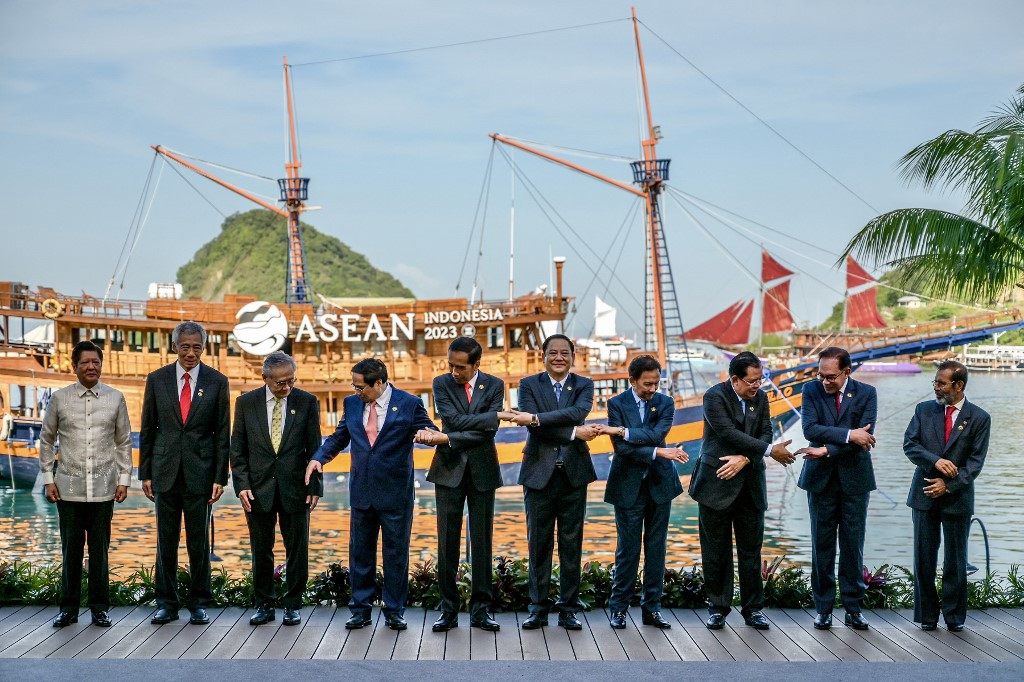Popular Reads
Top Results
Can't find what you're looking for?
View all search resultsPopular Reads
Top Results
Can't find what you're looking for?
View all search resultsASEAN marching toward digital community 2045
The current geopolitical tensions have shifted the world toward a multipolar paradigm as hegemonic dominance and resulted in unsustainable development.
Change text size
Gift Premium Articles
to Anyone
T
he top 100 issues that have been most searched and used these days all relate to one word: digital! Everything you think, see, say and do is related to digital in some way. In this era, digital has swept every corner of our lives.
One important issue among the 125 articles of the ASEAN Chairman's Statement resulting from the ASEAN Summit in Labuan Bajo, East Nusa Tenggara earlier this month is Article 60, which states, "[…] with a view to achieving inclusive digital transformation toward an ASEAN Digital Economic Community 2045".
The next summit during Indonesia’s ASEAN chairmanship is scheduled for Sept. 5-7.
First, let us reflect on the importance of the ASEAN Summit in setting a vision for ASEAN. In 2003, ASEAN agreed to establish the ASEAN Economic Community (AEC) by 2020, which was later accelerated to 2015.
In 2011, ASEAN decided to realize its East Asian integration by cementing the Regional Comprehensive Economic Partnership (RCEP), consisting of the 10 ASEAN countries and its five main trading and investment partners. The combined 15 countries represent one-third of the global population. RCEP countries also represent 30 percent of global gross domestic product (GDP), 27 percent of global trade and 30 percent of global foreign direct investment, making it a formidable economic bloc with increasing influence in the global economic landscape.
Second, let's try to understand the rationale behind establishing the ASEAN Digital Community 2045. ASEAN has a long history of colonization and imperialism, dating back to the late 17th century and extending well into the 20th century. Despite gaining independence, many Asian countries still face the lingering effects of colonialism and imperialism, such as economic inequality, political instability and social clashes.
With this long history of colonization and imperialism in Southeast Asia, it is crucial to keep ASEAN as a "region of peace", which does not take sides and stays independent both politically and economically. By reflecting on the past, ASEAN countries can better navigate current challenges and work toward creating a more equitable and prosperous future for all.
Together, ASEAN can navigate current challenges and work toward the shared dream through the establishment of the ASEAN Digital Community 2045.
Third, the current geopolitical tensions, which are expected to escalate, have shifted the world toward a multipolar paradigm as hegemonic dominance and resulted in unsustainable development. This shift presents an opportunity and momentum for rising middle-power countries such as Brazil, South Korea, South Africa and Southeast Asia to take a stance and play a bigger role in the ever-dynamic multipolar global community.
The rising power of these emerging economies should not be underestimated, as globalization leads to interconnectedness and bilateral trade links with middle-power countries (Siddiqui, 2021). It is crucial for these nations and the grouping to leverage their growing economic and political influence to promote greater cooperation and collaboration with the international community. The rise of middle-power countries brings with it the potential for more sustainable and equitable development, as well as inclusive growth.
Considering these three reasons, ASEAN's relevance both politically and economically cannot be understated, particularly with its young and dynamic population. Embracing digital innovation while emphasizing key human capital development, including inclusivity for women, youth, and people with disabilities will be one way to lift up ASEAN's relevance in the global economy.
Digital innovation will change not only the way we work but also the way we live and the whole economic system. Over the past few decades, digital technologies have enhanced connectivity, financial system, and access to trade and public services. This shift has changed the focus on goods and services trade from what is traded to how it is traded.
The digital economy is rapidly growing, and the pandemic has accelerated digital transformation. Digital trade, including digital payments and digital service delivery, stood at US$4.9 trillion in 2021 and is estimated to reach over $10 trillion by 2030. In ASEAN, digital trade is expected to grow to $360 billion by 2025 and $1 trillion by 2030, accounting for 10 percent of the global digital trade market in 2030 (Statista, 2022).
The rise of digital innovation could be seen in the acceleration of e-commerce, digital payments and the emergence of new business models, which are changing the whole economic system. Digital technologies and digital innovation are not just a trend, but a fundamental shift that will continue to shape our lives for decades to come.
Through these efforts, ASEAN can fully realize the potential of the digital economy, creating new opportunities for growth and development in the region.
In addition, the increasing adoption of automation, artificial intelligence (AI), and other advanced technologies is altering the nature of work, leading to new job opportunities and increasing productivity as these technologies work faster with greater precision and accuracy, which ultimately reduces production and operational costs. The PriceWaterhouseCooper 2017 report highlighted that the use of automation and AI is set to increase by 2030, with an estimated $15.7 trillion added to the global economy through the widespread usage of automation and AI.
The ASEAN chairmanship of Indonesia is a crucial moment for the region, as it sets the tone and direction for ASEAN's future. By reaffirming the centrality of ASEAN and embracing digital innovation toward an inclusive digital transformation leading to the ASEAN Digital Economic Community 2045, ASEAN can achieve a more prosperous and resilient future.
***
Lili Yan Ing is secretary-general of the International Economic Association (IEA) and lead advisor for Southeast Asia region at the Economic Research Institute for ASEAN and East Asia (ERIA), Jakarta. Yessi Vadila is a trade specialist at ERIA. The views expressed are their own.










